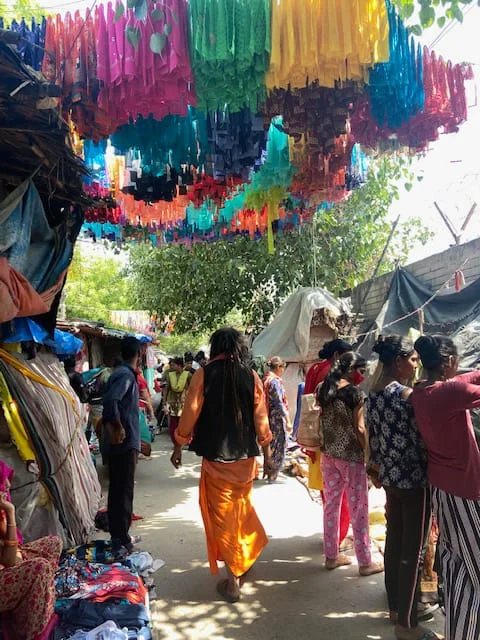In many bustling cities and towns across India, residents face a recurring and escalating challenge, intense heat waves. Known for their vibrant culture and dense populations, urban areas across the nation are now also becoming known for sweltering temperatures that impact daily life each summer. As climate change continues to influence weather patterns, various regions in India are witnessing some of the most extreme temperatures on record, highlighting a critical need for effective heat resilience strategies.
The Scorching Challenge of Heatwaves
Cities and towns across India, irrespective of their size and location, are grappling with the increasing severity of heatwaves. These episodes of extreme heat pose significant health risks, exacerbate living conditions in urban slums, and strain resources. For instance, Delhi witnessed a staggering five heatwaves between March and May in 2022, with temperatures soaring to a record 49.2 degrees Celsius. The intensity of these heat waves, intensified by urbanization and climate change, underscores the need for immediate and effective action.
SEEDS: Pioneering Change in Heatwave Resilience
Sustainable Environment and Ecological Development Society, recognizing the dire need for intervention across India, has stepped up to the challenge. Their approach is multifaceted, focusing on long-term resilience building in vulnerable communities throughout the country. Key initiatives include thermal insulation of shelters, establishment of safe drinking water stations, and community education on climate impacts. With the implementation of these strategies, SEEDS not only mitigates the immediate effects of heatwaves but also strengthens community preparedness for future challenges across diverse Indian landscapes.
How SEEDS is tackling this problem:
- Eco-Friendly Cooling Shelters
These shelters, primarily constructed using eco-friendly bamboo, serve as havens of respite for those most affected by the heatwaves, such as rickshaw pullers, rag pickers, and construction workers. These groups, often engaged in outdoor labor, are most susceptible to the harsh effects of extreme temperatures. The bamboo material not only ensures sustainability but also provides a natural cooling effect, making these shelters a practical solution for immediate heat relief.
- Community-Driven Initiatives
A remarkable aspect of these shelters is the active involvement of local women in their creation and design. Demonstrating ingenuity and resourcefulness, they have repurposed old sarees and plastic bottles to craft additional street shading structures. This community-driven approach not only empowers local residents but also fosters a sense of ownership and responsibility towards their environment. By involving the community, SEEDS ensures that the solutions are not only effective but also culturally relevant and locally accepted.
- Information, Education, and Communication (IEC) Strategy
To augment the impact of these cooling shelters, SEEDS employs an IEC strategy. This involves disseminating informative hand notes that offer insights into cool roofing solutions and guidelines for coping with extreme weather events. Placed strategically in Anganwadi centers, Primary Health Centers (PHCs), and within the community, these notes serve as vital tools for raising awareness and educating the populace about the risks associated with heatwaves and the best practices for staying safe.
The Cooling Shelters, complemented by the community’s active participation and the IEC strategy, epitomize SEEDS’ comprehensive approach to building heat-resilient communities. These initiatives not only provide immediate relief but also educate and empower residents, enabling them to proactively respond to and manage the risks posed by rising temperatures. This holistic method showcases SEEDS’ dedication to creating sustainable and resilient urban ecosystems capable of withstanding the challenges posed by climate change.
- Leveraging AI for Heatwave Mitigation
Embracing technology, SEEDS has incorporated AI into their arsenal against heat waves. This innovative approach involves using AI models to forecast areas and populations most at risk during a heatwave. This data-driven strategy enables SEEDS to target their interventions more effectively, ensuring that help reaches those who need it the most. By harnessing the power of AI, SEEDS is not only combating the current crisis but also setting a precedent for future disaster management strategies.
Rinki Gupta: A Beacon of Change
Rinki’s story begins in Bihar, a region frequently ravaged by natural disasters. Here, she learned the importance of preparation and resilience, often watching her grandfather store essentials ahead of floods. This early exposure to disaster management instilled in her a deep understanding of the complexities and challenges faced by vulnerable communities. Moving to Delhi post-marriage, her resolve only strengthened. Encouraged by her father-in-law, Rinki pursued further education, which broadened her perspective on social support systems and the lack thereof. This realization fueled her determination to drive positive change, first as a teacher and social worker, and now, as a project manager at SEEDS. Her personal experiences in Bihar and Delhi intertwine to form a rich tapestry of knowledge and empathy, making her uniquely qualified to address the challenges faced by disaster-prone communities.
At SEEDS, Rinki’s role is pivotal. She harnesses the power of AI to identify and prioritize areas in India that are most susceptible to heatwaves. This tech-driven approach allows for targeted interventions, making relief efforts more efficient and effective. Rinki’s work, however, goes beyond just data analysis. She is deeply involved in community mobilization and awareness programs, helping people understand and prepare for the risks of heatwaves. Her approach is inclusive, ensuring that the solutions developed under her guidance are not only technologically sound but also culturally sensitive and community-focused. Rinki’s ability to blend her grassroots experiences with cutting-edge technology exemplifies her innovative and empathetic approach to disaster management and climate resilience.
Conclusion
SEEDS’ work is more than just a response to a natural hazard; it is a movement towards building sustainable, resilient communities capable of withstanding the challenges posed by climate change. By joining hands with SEEDS, we can all contribute to this noble cause and help safeguard the future of these vibrant cities and their inhabitants.
Read more: Marketing News, Advertising News, PR and Finance News, Digital News





